#Jerry Coyne
Text


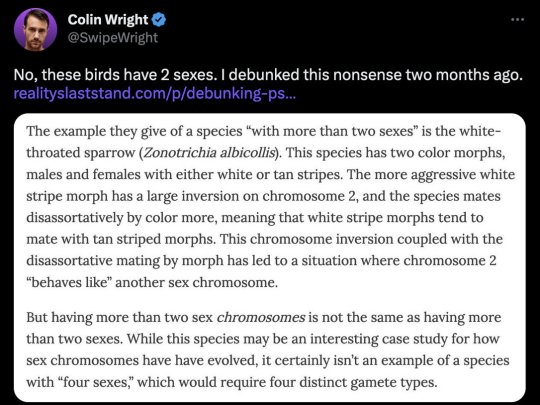
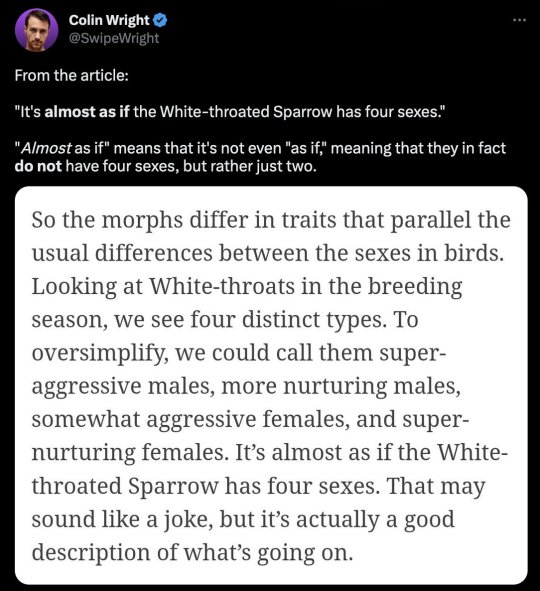

--

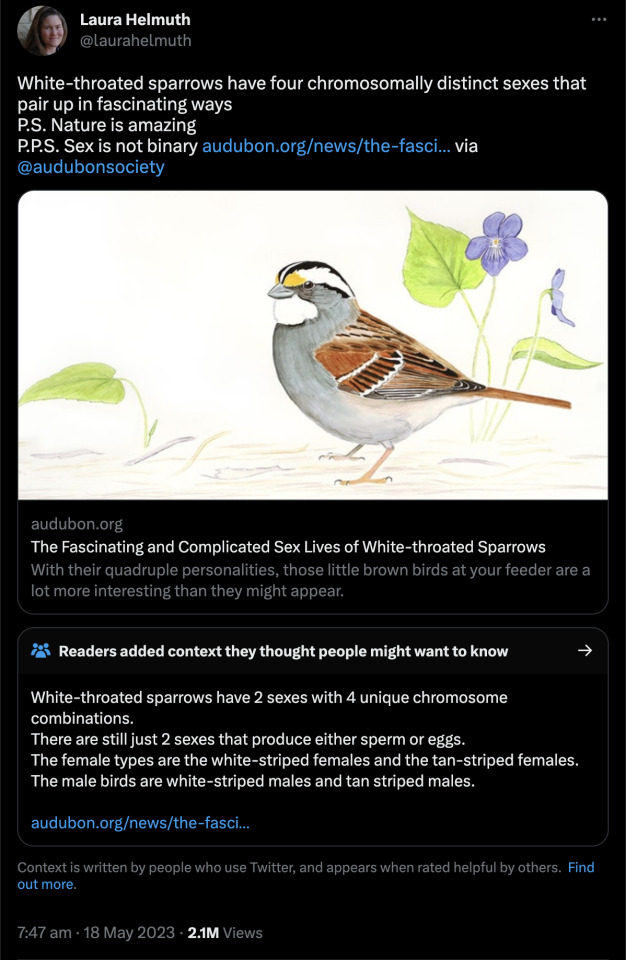
--

--
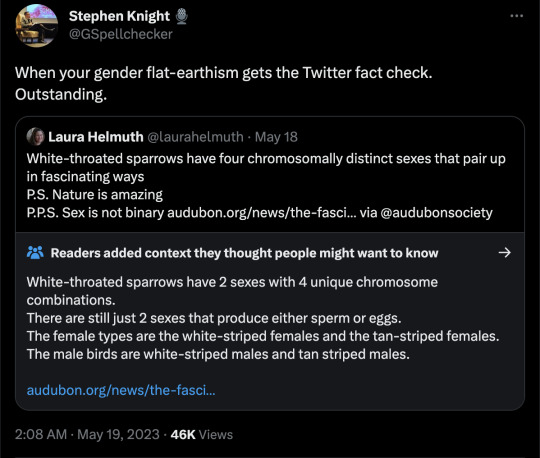
--

--
At this point, Pseudo-Scientific American is basically as reliable as The National Enquirer.
This is what ideological takeover looks like.
#Colin Wright#Emma Hilton#Nicholas Christakis#Jerry Coyne#Laura Helmuth#Scientific American#SciAm#pseudoscience#gender pseudoscience#sex is binary#sex binary#biology denial#gender flat earth#gender flat earthers#gender ideology#queer theory#sex denialism#biology denialism#biology#wokeness#woke#wokeism#cult of woke#wokeness as religion#PseudoScientific American#religion is a mental illness
687 notes
·
View notes
Text
"In religion, faith is a virtue. In science, faith is a vice."
Jerry Coyne, biology professor (b. 30 December 1949)
2 notes
·
View notes
Quote
If, after all, we are simply beasts, then why not behave like beasts?
Jerry Coyne
1 note
·
View note
Link
A reader sent me this announcement of a talk given at Cornell University by a scientist from the California Academy of Science. I reproduce the announcement in full, complete with italicization and bolding, though I’ve removed Zoom links and email addresses. (I can’t find the talk online, though she does have a short talk on “Ecology as a Locus for Social Change.) I won’t belabor it at length, as I find its content simply flabbergasting, but I want to point out five things:
It is “critical ecology” in that it infuses real science (ecology) with “critical theory”, itself containing a big dollop of postmodernism.
It is written in the obscurantist style of postmodernism fused with modern wokeist strains (e.g., use of preferred pronouns)
It is tendentious: there is no way that this style of science can be objective. Its aim, as suggested below, is simply to confirm preconceptions of the writer and to push her ideology into ecology. Note especially this sentence: “Pierre aims to offer systemically oppressed populations a praxis for redress beyond environmental justice.” This is social engineering, not science.
This is also an example of the invasion of wokeism into science, as instantiated by Steve Pinker’s recent statement on climate change in the journal Science. But at least the Science stuff, however wrongheaded, was explicitly about policy. Here we have what purports to be a form of science that involves hypothesis testing, but the answers must only come out in a preferred direction.
Note the criticism of “objectivity,” as in this sentence: “critical ecology also provides a space to address the tension present in defining what is ‘objective’, a practice that has neglected the phenomena experienced by racialized communities.” Note that “objective” is in scare quotes, and is opposed to the lived experience of those in racialized communities. It is this redefinition of “objectivity” as “the master’s (e.g. white supremacist’s) tools” that poses the biggest danger of science. Science then merely becomes a matter of one’s preferred opinion or “lived experience”: things not checkable by scientific methods.
The entire announcement is indented.
[@mitigatedchaos]
0 notes
Text
It’s funny when sceptics or others critical of some relatively mainstream religion and/or cult and/or quasireligious social/political movement are willing to seize on anything that will make their target look bad and in so doing unwittingly/uncritically disseminate propaganda from fringier and insaner little cults bc nobody hates their comparatively normalised rivals like they do and they are too small or “out there” to show up on the radar of the sceptics. It’s like watching someone try to uproot weeds from their garden only to churn up innumerable infectious spores from the fungal parasites invisibly gnawing at those very roots of the offending vines or whatever
12 notes
·
View notes
Text
Ten Must-Read Books About Evolution
Evolution is one of the most fascinating topics in all of science. Numerous books have been written about it, each offering unique and valuable perspectives and insights. Here are ten of the most important books about evolution that you should read:
Charles Darwin’s “On the Origin of Species” – This classic work introduced the theory of evolution by natural selection in 1859 and has had a…

View On WordPress
#book reviews#Charles Darwin#evolution#Jerry A. Coyne#Jonathan Weiner#Richard Dawkins#Sean B. Carroll#Stephen Jay Gould
1 note
·
View note
Text
Why Evolution Is True - Croatia
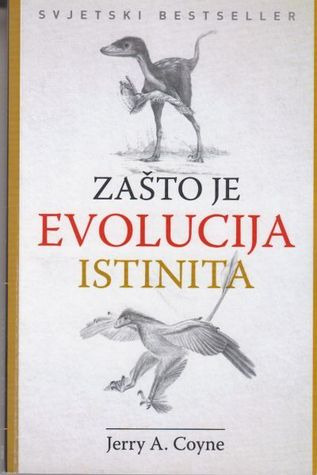
#Why Evolution Is True#croatian cover#book covers#book cover#biology#evolution#jerry a coyne#croatia#science books
1 note
·
View note
Video
youtube
Martin Luther King Jr. would have been 95 today had he lived.
I Have a Dream speech, via Jerry Coyne at WhyEvolutionIsTrue: https://whyevolutionistrue.com/2024/01/15/monday-hili-dialogue-447/
8 notes
·
View notes
Text
Lo vertiginosamente rápido que se me ha pasado este otro año refleja lo monótona y poco emocionante que es mi vida. Pero esto, que puede parecer un poco triste desde afuera, es algo que en realidad me gusta: no vivir «tiempos interesantes», como dice la apócrifa maldición china (los «eventos canónicos» de hoy en día), y carecer así tanto de momentos especialmente buenos como malos me produce el sosiego que mi forma de ser necesita. Sea como sea, el punto es que se han cumplido dos años desde que comencé a escribir aquí, y dos años no es precisamente poco, sobre todo si se tiene en cuenta que lo hago con frecuencia. Incluso las cosas que se disfrutan exigen algo de esfuerzo y dedicación, por lo que no puedo evitar sentirme contento por haber logrado mantener otros 365 días la constancia que me propuse.
En lo que respecta a las lecturas me siento como siempre: satisfecho e insatisfecho a la vez. Varios libros que tenía ganas de leer los he leído, pero otros muchos, ya sea por falta de tiempo o por no haberme sentido capaz (mayoritariamente esto último), no. La vida, sin embargo, —y como también escribí en la publicación del año pasado— continúa: mientras no me abandone el ánimo y la salud, las oportunidades de hacerlo estarán. Manteniendo la costumbre, los tres libros que más he disfrutado leyendo este año han sido El asilo y otros relatos de lo extraño de Robert Aickman, La naturaleza de Lucrecio y Carta de una desconocida de Stefan Zweig; los que menos, Oso de Marian Engel, Sor Monika de E. T. A. Hoffmann y La felicidad de la familia de Osamu Dazai. Aun en los casos en que la experiencia de haberlo leído haya sido lo único rescatable, no hay libro por muy malo que sea que no deje algo, por lo que guardo gratitud por cada uno de los autores.
La lista de los libros de los cuales hice un comentario es la siguiente:
· Piero Della Francesca, de Kenneth Clark
· La prueba del laberinto, de Mircea Eliade
· Fragmentarium, de Mircea Eliade
· Jesucristo, ¡vaya timo!, de Gabriel Andrade
· Ocultismo, brujería y modas culturales, de Mircea Eliade
· El juego del escondite, de Wilkie Collins
· El maestro de los cinco sauces, de Tao Yuanming
· Por qué no soy musulmán, de Ibn Warraq
· Los cuarenta y siete ronin, de Shunsui Tamenaga
· El vértigo, de Eugenia Ginzburg
· El gaucho Martín Fierro
La vuelta de Martín Fierro, de José Hernández
· Pequeños cuentos misóginos, de Patricia Highsmith
· Diarios y cuadernos 1941-1995, de Patricia Highsmith
· Suspense, de Patricia Highsmith
· El talento de Mr. Ripley, de Patricia Highsmith
· El infierno de los jemeres rojos, de Denise Affonço
· El latín en Chile, de Walter Hanisch Espíndola
· La gran hambruna en la China de Mao, de Frank Dikötter
· Águilas y jaguares, de Carlos Alfonso Ledesma y Raymundo César Martínez
· El Talmud, de César Vidal
· Regreso de la URSS, de André Gide
· Viaje a la revolución. Teoría y práctica del bolvechismo y otros ensayos, de Bertrand Russell
· Literaturas de Anáhuac y del Incario, de Miguel León-Portilla
· La matanza de Katyn, de Thomas Urban
· Beethoven contado a través de sus contemporáneos, de O. G. Sonneck (ed.)
· El evangelio de las anguilas, de Patrik Svensson
· Poemas del río Wang, de Wang Wei
· Cicerón, de Pierre Grimal
· Yo, comunista en Rusia, de Ettore Vanni
· El silencio de la luna, de Javier Martín Ríos
· El Terror bajo Lenin, Jacques Baynac
· Por qué la teoría de la evolución es verdadera, de Jerry Coyne
· Túpac Yupanqui, de José Antonio del Busto
· Poesía completa, de Joan Salvat-Papasseit
· La Biblia contada para escépticos, de Juan Eslava Galán
· La vida cotidiana durante el estalinismo, de Sheila Fitzpatrick
· La vida enmascarada del señor de Musashi, de Jun'ichirō Tanizaki
· Epigramas (volumen II), de Marcial
· El fraude de la sábana santa y las reliquias de Cristo, de Juan Eslava Galán
· Jesús no dijo eso: los errores y las falsificaciones de la Biblia, de Bart D. Ehrman
· Trece poetas del mundo azteca, de Miguel León-Portilla
· Nerón: la imagen deformada, de Pilar Fernández Uriel y Luis Palop
· La pagoda blanca. Cien poemas de la dinastía Tang, de Guillermo Dañino (ed.)
· El pensamiento arcaico, de Jesús Mosterín
· La filosofía oriental antigua, de Jesús Mosterín
· La filosofía griega prearistotélica, de Jesús Mosterín
· Aristóteles, de Jesús Mosterín
· Las redes del terror, de José María Faraldo
· La tragedia griega: una introducción, de Ruth Scodel
· Las primeras poetisas en lengua castellana, de Clara Janés (ed.)
· Una historia natural de la curiosidad, de Alberto Manguel
· Obras completas, de Epicuro
· El cuarto gris, de Eden Phillpotts
· Lina Prokófiev: una española en el gulag, de Valentina Chemberdjí
· Las maravillas del mundo antiguo, de Valerio Massimo
· Epicuro, de Carlos García Gual
· Chuang-Tzu, de Octavio Paz
· Apología del taoísmo, de Giuseppe Tucci
· El epicureísmo, de Emilio Lledó
· Las pseudociencias, ¡vaya timo!, de Mario Bunge
· Epicuro, de Walter F. Otto
· Epigramas funerarios griegos, de María Luisa del Barrio Vega (ed.)
· Cantos de amor y de ausencia, de Xu Zonghui y Enrique Gracia (eds.)
· Reflexiones contra la religión, de Mark Twain
· En el país de la mentira desconcertante, de Ante Ciliga
· Una curiosa historia del sexo, de Kate Lister
· El dragón del estanque, de S. S. van Dine
· ¡Que los dioses nos ayuden!, de Néstor F. Marqués
· Cajal: un grito por la ciencia, de José Ramón Alonso y Juan Andrés de Carlos
· La muerte de Montaigne, de Jorge Edwards
· Cuadernos (volumen I), de Georg Christoph Lichtenberg
· El instante de peligro, de Miguel Ángel Hernández
· Consolaciones. Apocolocintosis, de Séneca
· El patio, de Jorge Edwards
· Ingenuos: el engaño de las terapias alternativas, de Vicente E. Caballo e Isabel C. Salazar (dirs.)
· El whisky de los poetas, de Jorge Edwards
· Cartas desde el gulag, de Luiza Iordache Cârstea
· Filosofía para médicos, de Mario Bunge
· Velázquez. Vida, de Bartolomé Bennassar
· El misterio del pabellón rojo, de Robert van Gulik
· Tratados filosóficos y autobiográficos, de Galeno
· Ficciones filosóficas del Zhuangzi, de Romain Graziani
· Jesucristo Superstar. Ópera rock, de Marta García Sarabia
· Gulag, de Anne Applebaum
· Core: sobre enfermos, enfermedades y la búsqueda del alma de la medicina, de Andrzej Szczeklik
· Martín Rivas, de Alberto Blest Gana
· Las hermanas, de Stefan Zweig
· Catarsis: sobre el poder curativo de la naturaleza y del arte, de Andrzej Szczeklik
· El cristianismo al descubierto, de Holbach
· El sueño de la historia, de Jorge Edwards
· Tratados hipocráticos (volumen I), de Hipócrates
· Filosofía de la cirugía, de René Leriche
· Historia curiosa de la medicina, de Pedro Gargantilla
· Poesía completa, de William Shakespeare
· La lámpara roja, de Arthur Conan Doyle
· El asilo y otros relatos de lo extraño, de Robert Aickman
· Las infinitas vidas de Euclides, de Benjamin Wardhaugh
· Bajo la sombra del Vesubio, de Daisy Dunn
· Franklin Evans, el borracho, de Walt Whitman
· Caballero Jack, de Anne Lister
· La felicidad de la familia, de Osamu Dazai
· Breve historia de las batallas navales de la Antigüedad, de Víctor San Juan
· El mito bolchevique, de Alexander Berkman
· Dos años en Rusia, de Emma Goldman
· La cerilla sueca y otros cuentos, de Antón Chéjov
· Lucrecio. La miel y la absenta, de André Comte-Sponville
· Pensamiento estoico, de Eduardo Gil Bera (ed.)
· El estoicismo, de Jean Brun
· Cinismos, de Michel Onfray
· Historia de la mujer convertida en mono, de Jun'ichirō Tanizaki
· Figuras de la historia de Roma, de Theodor Mommsen
· Mi viaje a la Rusia sovietista, de Fernando de los Ríos Urruti
· Yatsuhaka-Mura, de Seishi Yokomizo
· Mi vida, de Girolamo Cardano
· Ante todo, no hagas daño, de Henry Marsh
· Asesinato en el honjin y otros relatos, de Seishi Yokomizo
· Historia de O, de Dominique Aury
· Antología de la poesía china, de Juan Ignacio Preciado Idoeta (ed.)
· Así es Rusia, de Johann Philipp
· Sor Monika, de E. T. A. Hoffmann
· El tesoro de Franchard, de Robert Louis Stevenson
· Robert Louis Stevenson, de G. K. Chesterton
· Los traficantes de naufragios, de Robert Louis Stevenson
· Bajamar, de Robert Louis Stevenson
· Vivir: ensayos personales y autobiográficos, de Robert Louis Stevenson
· Audición, de Ryū Murakami
· Conversaciones con Arrau, de Joseph Horowitz
· El monasterio encantado, de Robert van Gulik
· El pabellón de oro, de Yukio Mishima
· Breve historia de Jesús de Nazaret, de Francisco José Gómez
· Vida de una geisha, de Mineko Iwasaki
· El problema final, de Arturo Pérez-Reverte
· Cantares de Ise (anónimo)
· El fantasma del templo, de Robert van Gulik
· Tres cuentos chinos, de Robert van Gulik
· La vida sexual en la antigua China, de Robert van Gulik
· Un pu��ado de arena, de Takuboku
· Retrato de Shunkin, de Jun'ichirō Tanizaki
· Poesía completa, de Li Qingzhao
· La confesión de Claude, de Émile Zola
· La palabra arrestada, de Vitali Shentalinski
· Como un espectro. Miao Dao, de Joyce Carol Oates
· El médico y el enfermo, de Pedro Laín Entralgo
· La naturaleza, de Lucrecio
· ¿Fue él?, de Stefan Zweig
· Ardiente secreto, de Stefan Zweig
· El amor de Erika Ewald, de Stefan Zweig
· Los ojos del hermano eterno, de Stefan Zweig
· Mendel el de los libros, de Stefan Zweig
· Carta de una desconocida, de Stefan Zweig
· Castellio contra Calvino, de Stefan Zweig
· Magallanes, de Stefan Zweig
· Jeremías, de Stefan Zweig
· La bestia debe morir, de Nicholas Blake
· Hombre lascivo y sin linaje, de Ihara Saikaku
· El nuevo libro de Sonia, de Michael Innes
· 533 días, de Cees Nooteboom
· El ala y la cigarra, de Juan Manuel Rodríguez Tobal (trad.)
· Japón, un intento de interpretación, de Lafcadio Hearn
· Oso, de Marian Engel
· La historia de los fantasmas, de Roger Clarke
· Filosofía de la medicina, de Cristian Saborido
· Historia de la filosofía romana, de Adolfo Levi
5 notes
·
View notes
Text
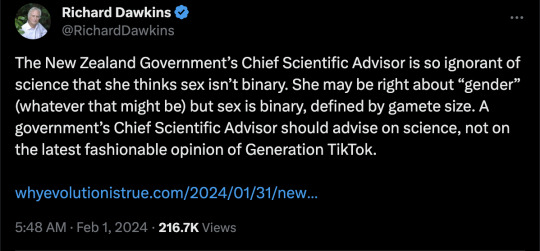

By: Jerry Coyne
Published: Jan 31, 2024
I predicted (or hoped) that with New Zealand’s new Prime Minister, Christopher Luxon of the centrist National Party, New Zealand’s educational system, which was circling the drain, would find its way out. After all, Luxon promised to reform the educational system by emphasizing “teaching the basics.” (New Zealand performs poorly in math and reading compared to countries of comparable well being.) Most of all, I hoped that Luxon would purge the wokeness of the Kiwi educational system, especially the teaching of indigenous superstitions and “ways of knowing” that seem to be insinuating themselves into science education.
Now I’m not so sure.
Reader Al sent me the tweet below, which was like a (mild) punch in the gut. It comes from the (now protected) account of New Zealand’s Chief Science Advisor, Dame Juliet Gerrard. She was appointed for a three-year term on July 1, 2018, a term that was apparently renewed in 2021 by the woke and now ex-Prime Minister Jacinda Ardern. Gerrard’s present term expires on June 30 of this year. I hope Luxon replaces her, as she’s clearly woke and misguided, and a fan of those who sacralize the indigenous people, a tendency that’s warped New Zealand academics.
At any rate, have a look at this tweet:
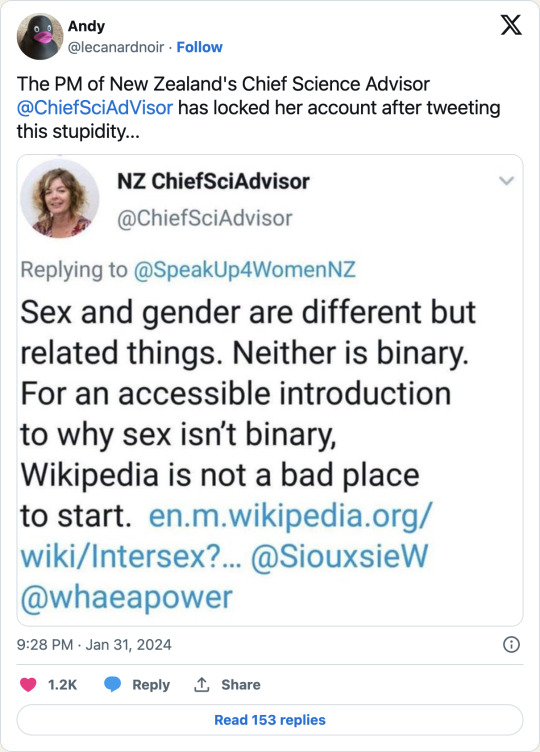
The first sentence is okay, the second is crazy, at least regarding “sex”. The third is mixed, for if you go to Wikipedia under Intersex, you see the declaration that sex is not binary, but also that indicators of sex, like genitalia, are pretty close to binary:
Intersex people are individuals born with any of several sex characteristics including chromosome patterns, gonads, or genitals that, according to the Office of the United Nations High Commissioner for Human Rights, “do not fit typical binary notions of male or female bodies”.
Sex assignment at birth usually aligns with a child’s anatomical sex and phenotype. The number of births with ambiguous genitals is in the range of 1:4,500–1:2,000 (0.02%–0.05%).[3] Other conditions involve atypical chromosomes, gonads, or hormones.
The best source I know of for the frequency of intersex is that of Leonard Sax, which is also quoted ion the Wikipedia article:
A study published by Leonard Sax reports that this figure includes conditions such as late onset congenital adrenal hyperplasia and XXY/Klinefelter syndrome which most clinicians do not recognize as intersex; Sax states, “if the term intersex is to retain any meaning, the term should be restricted to those conditions in which chromosomal sex is inconsistent with phenotypic sex, or in which the phenotype is not classifiable as either male or female,” stating the prevalence of intersex is about 0.018%. This means that for every 5,500 babies born, one either has sex chromosomes that do not match their appearance, or the appearance is so ambiguous that it is not clear whether the baby is male or female.
In both cases, the number of people considered “intersex” is very low. But that’s pretty much irrelevant to the discussion of whether sex is a spectrum, for biologists, as we discussed yesterday, use a definition of sex involving gametes: if you have the reproductive apparatus to produce small mobile gametes (even if that apparatus is inactive), you’re a male who makes sperm. If you have the apparatus to produce large immobile gametes (even if you can’t, as if you’re postmenopausal or sterile), you’re a female who makes eggs. If you don’t fit either of these classes, you’re often (but not invariably) classified as intersex. The athlete Caster Semenya, for example, has internal undescended testes, designed for making sperm, but other female sex traits, like a vagina. Biologically I’d call her a male, but wouldn’t quarrel if others want to call her “intersex”.
But the point is that intersex individuals are not members of a third sex, so don’t really affect the sex binary: there remain only two types of gametes. We have males, females, and those unclassifiable, with the latter having frequency of one individual in 5600.
I keep repeating myself on the sex binary, along with others like Richard Dawkins, Carole Hooven, and Colin Wright, but I’ll add that the sex binary humans says nothing about the humanity of intersex individuals or transgender individuals (who usually can be classified as biological sex). With a few exceptions involving things like sports and jails, the legal and moral rights of transgender or intersex individuals are independent how “sex” is defined by biologists, and these individuals should never be denigrated for their desire to transition or for the fact that they have a biological condition that makes them intersex.
Finally, the Science Advisor cites Siouxie Wiles, who you can read about on this site (two posts here), a science communicator and microbiologist who’s done some good things, but also vigorously opposed the Listener letter that argued against teaching indigenous ways of knowing as science. As for @whaeapower on X, it’s another protected account, so I don’t know what it’s about. It may be a Māori site given that “whae” means “mother or aunt” in that language, and because Dame Gerrard has a Māori koru (fern front) tattoo on her back.
At any rate, I guess Dame Gerrard did protect her tweets, as this is what you find when you look for them:

My point, however, is this: the official Science Advisor to the Prime Minister should not be making erroneous statements about sex, even if those statements are made to give succor to people that are not of conventional gender. That she misunderstands sex does not bode well for science education in New Zealand if Dame Gerrard continues in her position after June 30.
As for whether what looks like a quasi-official “X” account should be protected, well, you can be the judge.
==
The supposed Chief Science Advisor position for any country should not be held by someone pretending they don't know where babies come from. It would be far better to employ someone like Ken Ham; he thinks we all got here by magic, but he doesn't pretend he doesn't know how a baby is made.
A post like this should be taken as a formal resignation letter.
#Jerry Coyne#Richard Dawkins#Juliet Gerrard#anti science#antiscience#gender ideology#queer theory#biology denial#biology denialism#biological sex#intersex#human reproduction#religion is a mental illness
10 notes
·
View notes
Text
Carne-tastic
I have been looking forward to this day for awhile. Today was the day I was going to get to play Carne Golf Links located in Bellmullet approximately an hours drive from Mount Falcon. This course was ranked by Tom Coyne as the number one golf course he played during his Ireland journey that led to his writing his bestseller, “A Golf Course Called Ireland”. I will say this, it’s hard to argue with his assessment of Carne.
First of all, today was a beautiful day. Sunny, low sixties and light winds. So a great day for playing 27 holes of golf on a course that the designer said, “God designed it, I just discovered it.” I’m a little lost for words to describe Carne. I thought Enniscrone was a dune-fest, Carne was Enniscrone on steroids.
Besides the need to be a human mountain goat, the course design was creative, challenging but fair and scenic beyond description. I’m going to post more pictures than normal so hopefully you can see for yourself just what I’m trying to describe. It’s still difficult to capture the beauty and elevation changes with an iPhone!
The Carne staff couldn’t have been more helpful and I got a chance to sit down and have a Guinness with Jerry McGuire, the general manager of Carne. We talked about how the course has been doing and all the recognition the course has been getting over the last couple of years. We also chatted about a couple of investment opportunities at Carne that are going to becoming up in the next couple of years and he invited me to become a lifetime international member. My friend Tom had put in a good word about me! Interesting stuff which is going to require me to come back here again!!
I really enjoyed the entire 27 holes which would have been impossible to play without a caddie. You could get lost in those dunes! My caddie was great, her name was Ann. She’s the first woman caddie I have ever had in Ireland or any place else for that matter. One interesting fact about Ann McGarry.....wait for it...she was 78 years old!! Yes, and she walked those hills and valleys or maybe I should say scaled, without a problem. We walked 21,000+ steps and there was not a level hole on the course. You could climb 15 foot mounds in the fairways often and walking straight up or straight down the fairway hills with mounds on the hills was not unusual. Ann was a great caddie and she was quite a golfer in her day. She still plays the course regularly and caddies two to three days or more a week. She was AWESOME.
Scoring was a challenge today. I shot 91 on the first 18 and 42 on the last nine carding three pars and a birdie on the last 9 and only 2 pars on the first 18. I loved every minute of the 27 holes but I was ready to call it a day when my last putt dropped!! Ann gave me a big hug and a peck on the cheek...probably to celebrate the fact that she doesn’t have to caddie for me anymore:-)
Stats Summary
Score 91 & 42/869
Holes Played - 27/171
Yardage played - 6017 & 3127/58279
Lost Balls 4/19
No. of Pars or better - 5 pars 1 birdie/5 birdies 35 pars
Steps - 21,545/133,847
Miles Walked - 10.17/62.74
Green Fees - $135/$1955
Caddie Fees - $80 plus tip/$715 plus tip
Dinner tonight was at The Cot & Cobble. It didn’t disappoint! But enough for now, to be truthful, I’m worn out and am ready for a shower, an early night to bed and a day off tomorrow! I have such a tough life don’t I! :-) gb
4 notes
·
View notes
Quote
The message of evolution, and all of science is one of naturalistic materialism. Darwinism tells us that, like all species, human beings arose from the working of blind, purposeless forces over eons of time. As far as we can determine, the same forces that gave rise to ferns, mushrooms, lizards, and squirrels also produced us.
Coyne, Jerry. ‘Why Evolution Is True.’
2 notes
·
View notes
Text
one o’ those meme things
Think it’s been years since I’ve done one of these!
tagged by @elektroyu
suggestion: tag 9 people you’re interested in getting to know better
favourite color: All time fave(s)? Turquoise. Copper. Also very partial to oranges and yellows and select shades of green.
currently reading: “Why Evolution Is True” by Jerry Coyne. I regrettably don’t read a lot these days, but I blame time management and my choice of hobbies.
last song: An endless blur of Cocteau Twins these days, but I’m terribly partial to “Serpentskirt” lately.
last series: Potentially too many answers because I watch series in bits and pieces. But as far as recently finished, “Killing Eve.”
last movie: In terms of which movie I put on myself to watch? Nausicaa of the Valley of the Wind.
sweet/spicy/savory: Savory (I’m a sucker for salt), and spice is always nice. I’m pickiest about sweet flavors; it’d better be fruit-flavored.
currently working on: Still polishing that last bald eagle piece up, getting the garden slowly up and running, and trying to be a better me. But mostly I’m asleep all the time now.
I’m too insecure to tag people, so heh... yeah!
#text post#getting to know meme#april rambles#I don't get around to new music/shows/etc very often heh#J and I tend to watch series together when we remember#I don't watch a lot of stuff on my own because they tend to distract me to the point of paralysis#which is why I haven't binged all my Planet Earth series yet!!!
16 notes
·
View notes
Text
«Lo ammetto: tutte le volte che incontro uno scienziato religioso resto sorpresa. Com’è possibile che un tizio che da matricola è passato attraverso le vessazioni degli studenti anziani, che ha in tasca un dottorato di ricerca e che nel giro di un pomeriggio sarebbe capace di prendere una presentazione PowerPoint di un collega sul genoma dei nematodi e ridurla a brandelli grandi come spaghettini cinesi, com’è possibile che poi vada a casa, legga su una cronaca di duemila anni fa, strapiena di contraddizioni interne, di una scoperta da premio Nobel come la “risurrezione dai morti” e dica, caspita!, mi ha convinto? Il bravo scienziato non si chiede com’era composto il gruppo di controllo?» (Natalie Angier, “My God Problem”, American Scholar 73, 2004, cit. come epigrafe al secondo capitolo di Jerry A. Coyne, “O scienza o religione. Perché la fede è incompatibile coi fatti”, 2015, tr. it. Nessun Dogma, Roma 2016).
4 notes
·
View notes
Text

I actually looked up that word because of something else I was reading from Hart, something which is much less verbose than that quotation even if it uses technical terms too (I still feel [self-]conscious about the Jerry Coyne School of Hermeneutics).
It's related to Kant's idea of intuition as an end, seeing things adequately for ourselves and not simply myself - hence the part about "universal communalization". If *that* makes sense!
1 note
·
View note
Text
Don't you just love when people talk out off their asses?
I'm not a archeologist or a doctor or something similar to that(neither is the author of this artical), so i dont know shit. That dosent mean i can't have an opinion on what people say, if he can say his opinion then i can as well. That being said this is purly my opinion and some of it might not be correct
This comes from a Norwegian science website (https://www.forskersonen.no/debattinnlegg-historie-jakt-og-fangst/nei-kvinner-var-ikke-bedre-jegere-enn-menn-i-steinalderen/2316475) and is a debate piece
(sorry in advance if anything i written wrong or badly, english my second language)
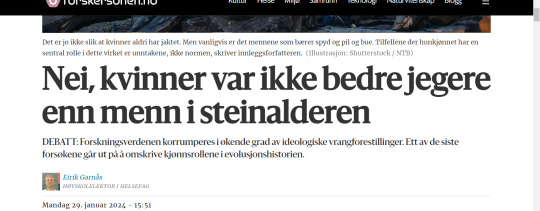
"No, women were not better hunters than men inn the stoneage"
Not saying women were better than men, but neither were men better than women, but like who really knows the stone age was milions of years ago.
BTW the author is a "høyskolelektor i helsefag" which is a collage lecturer/teacher who teaches health professions. He's criticizes the Scientific American magazin for talking about/debunking the 2 sexes theory and that women can't possibly be better than men in sports or anything that is male dominated(with a sprinkle of transphobia)
He links to the website of Jerry Coyne, who from what i gathered while a biologist is also a hard deserminist and antireligion that he seems to(me at least) not know how to seperate his personal opinions and scientific fact.
This is some of my favorite parts of the article/s

"There is a reason that female athletes drugs themselves with derivatives of male and not female hormones"
Btw the reason is that testosteron will promote muscle mass by increasing muscel protein syntesis and it (along with estrogen and cortisol) is a natrual steriod that we produce. The steroid that is used in sport is Anabolic steroids.
But why bring up that? If you want to talk about the diffrences hormons gives us, then there are better ways to go about it, no one is denying that estrogen and testosteron have widly different effects.
And talks about the female and male body diffrences, like that women have larger hips and chest then menn and in the last sentence says that womens fat-percentage makes them worse at sports like running and sprinting(ok??)
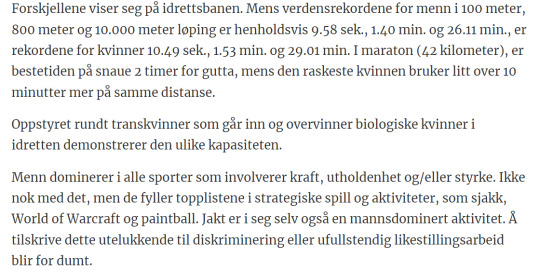
First he talks about the diffrenses in records for running between men and women in maratons.
There more reason to this then hormons and biological gender that makes the diffrence between world records of men and women.
If want to read something about this:https://www.outsideonline.com/health/training-performance/female-athlete-science-up-to-speed-book-christine-yu/
Then he says "the commotion around Transwomen that goes inn and wins over biological women in athletics demonstrate the diffrence in capacity"
??? Thats just not true. Transwomen are more often than not barred from womens sports and when they are allowed to participate they will get scorned by cis-women that either came behind them(like the transwomen dont even have to win just get before the wrong woman) or will get forced out by cis-women.
There after he says "men dominates inn all sports that involves power, endurance and/or strength. Not only that but they fill the toplists of strategic games and activities like chess, World of Warcraft and paintball. Hunting is in of itself also a mansdominatet activity. To attribute this to discrimination or uncomplete equality work is too dumb".
Again there are other reasons for this, women are literally pushed out of these sports. There are unfortunately still alot of cis-men that seem to think that women are not as smart as them or even that women are akin to objects. If you were in a heavily male dominated field(even with work outside of sports) there is a good chance of you as a woman to expirence harrasment and even sexual assult. When it comes to hunting it's often that women either have been bared form such a activity because of sexism or lack of interest because of it being so heavily cis-man dominated.

"men, not women are optimized for hunting"
"The ladies behind the publications argues that estrogen is like a prensentasion advencer. in reality it's testoseron that is the real battle- and performence hormone. meanwhile estrogen levels make women more form and caring, is raised testosteron connected to muscelmass, risktaking and vigor."
Fhis is just really weird to read. Why are we attributing hormons in general to war or care. If we think like this we essenily are telling people who dont fit inn this mold that they are less of a person, on top of that this is what leeds to people making fun of men who works or want to work in a women dominated field such as nursing, kindergarden teacher or similar professons.

"In women who train a lot and hard, and especially those with a low fat percentage (optimal for fast movement), it is not unusual to have menstrual disturbances. This falls under what is referred to in the fitness world as the female athlete triad: a constellation of physical problems that hard-training women often experience. Men can also be injured by a lot of exercise, but are not as susceptible as the ladies. They also do not experience reproductive resentment to the same extent, which supports the idea of better genetic conditions."
I might be wrong, but i think you would have to train excessively for that to happen. The same prosess can happen if you have anorexia. Hormon disurbences side effects can make menstruation worse as well. It dosen't only hurt women, elevated testosteron levels in men can be dangerous, as well as making our(everyone's) cortisol levels to lower so much that it can leave us in a chroniclly stressed state.

"A number of other documented gender differences paint a picture of the man, not the woman, as the hunter. The male gender demonstrates better spatial navigation, distance vision, throwing accuracy and power and explosiveness, to name a few. More muscle in the shoulders, arms, chest and back gives better throwing and carrying ability, and a penchant for creating and working in coalitions and teams provides the prerequisites for achieving common objectives. There is also no escaping the fact that it is the woman, not the man, who becomes pregnant, gives birth, breastfeeds and has a built-in sensor for baby crying."
I'll be honest and say that i dont know how to answer this. why is he reducing women down to childbearing? All this good talk about menand all you have to say about women is "babymaking machine". like there is nothing esle to say about women, no mention of women having better color vision. also how do we even know if any of this is purely biological and not just social? It is possible that it comes som how we are brought up.

"Instead of depriving men of what they are good at, why not cultivate what women are good at? It's not like women have never hunted. But usually it is the men who carry the spear and bow and arrow. The cases where the female gender has a central role in this work are the exceptions, not the norm. Gathering, including the acquisition of less mobile animals, is the dominant income-generating activity for women. We still see this to this day, with hunter-gatherer groups such as the Hadza and !Kung."
Taken what from who?? No-one is takning anything from men lol. "usually it is men who carry" how would you know? Did you go back in time and check? Why not metion native women like the Aeta women who hunted the same prey as the men as well as they were gatheres. People in hunter gather societies often weren't as gender segregated as we have thought and many newer studies tell us that women hunted either just as much or that the rolles weren't as gender specific as we've been told.
https://www.smithsonianmag.com/smart-news/early-women-were-hunters-not-just-gatherers-study-suggests-180982459/

"There are several things that women are better at than men. They typically have high social and emotional insight, good verbal skills, and the ability to care and multitask, to name a few. Just as the fact that men are good at physical and strategic challenges is a result of natural selection and adaptation, the female strengths are also rooted in evolution."
Is that really the truth tho? Is it really how we evolved? Is it really that rigid? Im personally not that convinced.

Trying to erase the differences between the sexes undermines, rather than empowers and celebrates, the woman, as it does not carry through in reality. There biology stands strong and big in the way of progressive leveling fantasy."
"Distortion of reality does not bring science or the sexes forward, but backwards."
Yeah, cause everything he has metioned is celebrating women. reducing women to be only a caretaker and childbearer is soooo celebrating/s. More and more it seems that it's rather what hes is spouting that isn't rooted in reality. Biology dosen't in any way stand in the way for progressive leveling fantasy, literally the opposite, more often than not it seems biologi and biologist agree with what we are saying and often it's them we get our information from.
That last sentence is has to be ironic, you can't seriously think that. How the fuck do you think we have comed as far as we have??? Without some form of reality distortion we wound't have the things we have. This is what most of the people in science we look up to or the inventors were told, like do you think Da Vinci or Tesla were told that they were geniuses in the beginning? No, most people thought that they were insane that there theorys or ideas were not rooted in reality.
If anything its thoughts and ideas as his that brings us backwards and not forwards.
0 notes